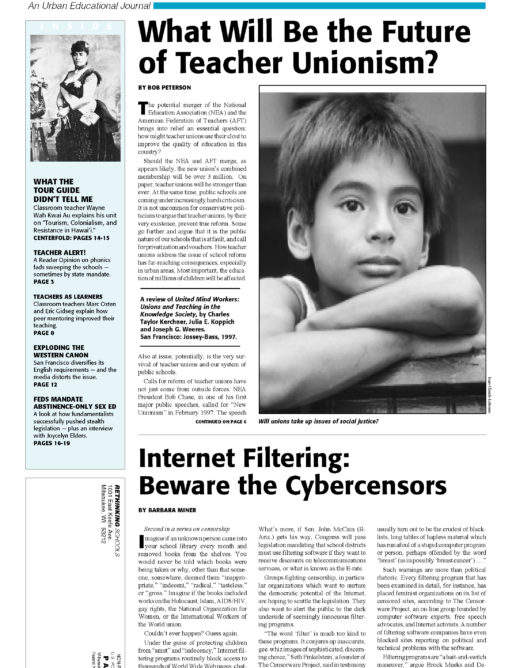SEX, etc.
A Newsletter by and for Teens
Jose and Diane saw their chance.
Diane’s parents were away for the weekend. The two had been dating for five whole weeks and they were ready.
So on Saturday night, Jose showed up, with no condom in his pocket, but with an idea of what was going to happen. And it did.
At age 17, Diane and Jose both lost their virginity. A few days later, they broke up. Diane’s mom found out what went down and laid down the law — no more Jose. He was crushed.
“I thought sex would make our relationship stronger,” says Jose, now 19 and a whole lot smarter. “But it didn’t work out that way. I really regret it.”
So begins an article in the latest edition of “Sex, etc.,” a newsletter on sexuality written for teens and by teens. In the story, by Angel Alamo, a senior at Camden High School in Camden, NJ, teens talk about the first time they had sex.
Alamo said the teens he interviewed for the story had no qualms about talking with him about such an intimate subject. “I did the interviews over the phone, and I told them we didn’t have to use their real names,” Alamo said. “I think they were comfortable talking to me.”
The only publication of its kind, “Sex, etc.” is a frank, sexually explicit newsletter published three times a year by the Network for Family Life Education, a coalition of public, private, and nonprofit agencies that supports family life education — including comprehensive sexuality education — in school and community settings. The network is housed in the Rutgers University School of Social Work in New Brunswick, NJ.
The eight-page newsletter, aimed at high school students, is distributed free — with a discussion guide — to 400,000 teens in 49 states. It is used in schools and teen centers and by city health departments, and is shipped to doctors’ offices, hospitals, juvenile detention centers, and other community-based organizations serving youth. Its cost is underwritten by foundations, corporations, and state government grants. Last May, the National Campaign to Prevent Teen Pregnancy recognized the impact of “Sex, etc.” at an awards dinner in Washington DC.
Articles in the newsletter cover a wide range of subjects, including: abstinence, contraception, teen parenthood, sexually transmitted disease, AIDS, gay and lesbian teens, sexual harassment and violence, abortion, substance abuse, and child sexual abuse. In addition to Alamo’s article, the latest edition of “Sex, etc.” carried stories titled “Am I My Partner’s Keeper?” on pregnancy prevention; “A Painful Lesson: Anyone Can Get Herpes,” on ways to prevent sexually transmitted diseases; a question-and-answer column featuring an interview with author Dr. Ruth Westheimer; and stories on teens and alcohol.
Nancy Parello, an Associated Press reporter who serves as newsletter editor and coordinator, said the key to “Sex, etc.” is that kind of balance. “We try to cover everything from every angle,” Parello said. “The kids write about abstinence — that there are good things about waiting. But we recognize that there are kids out there who are having sex, and that we need to speak to them as well.”
Parello recruits teens from across New Jersey to serve on the newsletter’s editorial board. Board members take part in two days of training on public health issues and journalism, and then meet eight Saturdays throughout the year with Parello to discuss issues related to teen sexuality, brainstorm story ideas, line up sources, and critique each other’s stories. Every story is reviewed for medical accuracy by Ann Schurmann, the Network’s program manager and a health educator who holds a master’s degree from Columbia University’s School of Public Health. When appropriate, story content is also reviewed by physicians and other health experts.
But the newsletter’s biggest draw is that it is written by teens for their peers. Most articles include interviews with teens who tell of their own sex-related experiences. “I know lots of teenagers who can’t talk to their parents about sex or go to their teachers,” said Anupama Mehta, 17, a senior at Old Bridge High School in Old Bridge, NJ. “For them, this is the only way to get good information. I wanted to be part of that process.”
Both Alamo and Mehta said it was important to approach the highly intimate subjects they write about with a high degree of professionalism and maturity. “The issue of STDs is very, very personal,” said Mehta, who wrote a story on genital warts for a recent edition of the newsletter. “But I can’t be afraid to ask questions that might be embarrassing. I have to ask. It’s very important to get this information out.”
Parello said she continues to be amazed by the serious, straightforward way the teenagers approach their subject matter and sources. “You get a lot more snickering and giggling going on when adults talk to kids about sex,” she said. “When kids talk to kids, it’s not as embarrassing. They’re really listening to each other.”

